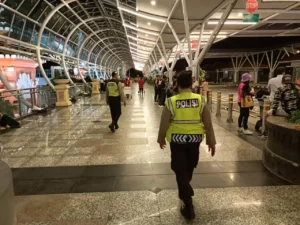In response to an ongoing outbreak of the Nipah Virus, authorities in Bali have implemented stringent health protocols to screen foreign tourists arriving at the I Gusti Ngurah Rai International Airport. The move comes after a circular letter from Indonesia’s Ministry of Health was issued last week, urging heightened vigilance and precautionary measures to prevent the virus from entering the country.
Circular Letter Number HK.02.02/C/4022/2023, jointly issued by Indonesia’s Ministry of Health and the Department for Disease Prevention and Control, is a comprehensive guide outlining risks, mitigation strategies, and guidelines for health professionals nationwide. I Nyoman Gee Anom, Head of the Bali Provincial Health Service, emphasized the importance of adhering to these directives during a press conference in Denpasar.

“By directions from the Ministry of Health, we must be alert to the threat of the Nipah Virus,” Anom stated. He further explained that temperature detection devices have been installed at the airport to identify individuals with elevated body temperatures. If a tourist’s temperature is above normal, they will be subjected to an interview. Should the tourist have recently visited a region where the Nipah Virus is known to be in circulation and displays symptoms such as an elevated temperature and acute respiratory tract infection, they will be promptly transferred to a hospital for a comprehensive assessment.
Anom reassured the public that Bali’s medical teams have been well-informed about the Nipah Virus, and a response plan is in place should the virus be detected in Indonesia. However, he emphasized that the virus has yet to be discovered within the country, and authorities are working diligently to maintain this status.
“Especially for Nipah Virus, a team of neurologists, surgeons, and others have been prepared because the virus can attack the brain,” Anom added. He expressed concerns about the virus’s extended incubation period, stating, “We must be careful because many Indian tourists go to Bali. I’m afraid because there is a certain incubation period; maybe you don’t have a fever at the airport.”
According to the World Health Organization, the incubation period for Nipah Virus can range from 4 to 14 days. However, rare cases with an incubation period of up to 45 days have been documented. Initial symptoms often mimic the flu, including fever, headaches, muscle pain, vomiting, and a sore throat.
As the virus progresses, symptoms may include dizziness, drowsiness, altered consciousness, and other neurological signs indicative of acute encephalitis. Difficulty breathing and acute respiratory infection are also associated symptoms of the Nipah Virus.
Testing for Nipah Virus can be done using RT-PCR and ELISA tests. Currently, no vaccine is available for the virus, and specific antiviral drugs remain elusive. Health officials in Bali remain committed to maintaining strict screening measures to protect locals and tourists from the potential threat of the Nipah Virus.
Travellers planning to visit Bali are encouraged to stay informed about any updates regarding health protocols and adhere to any airport screening measures to ensure all visitors’ safety and well-being.
Interested in this topic? Check out our other articles from Social Expat:

































